An Interracial Expat Couple’s Guide to Marrying in the UAE Courts
- Nicholette

- Oct 18, 2018
- 9 min read
Mabrouk!
You have met, fallen in love and made the life-changing decision to be bound to your special person as man and wife.
I personally believe that the moment you find that person, the worst has past.
So many others spend years, even entire lifetimes, searching and yearning for a love they never found.
So a thousand Mabrouks to you for finding your forever person!
Now, if you two are UAE expats, you may be asking yourselves which is better: to marry in your home country or to marry in the UAE?
If you decide on the former (outside UAE), you have to consider the inevitable pre-wedding planning and logistics, longer guest list, higher expectations from family and friends, more pending jobs post-leave and higher salary cuts.
If you, like my husband and I, do decide on the latter (a UAE wedding), then this guide is for you.
And even if you haven’t decided yet, this guide is still for you, to help you weigh your options.
While this guide was written from the perspective of a Filipina Bride and an Egyptian Bridegroom, I’m hopeful that this will still provide fresh information to what is currently available online, regardless of the nationalities of both parties.
First thing’s first: Can you get married in the UAE Courts?
Contrary to popular belief, non-Muslims can marry in the UAE Courts, provided that the Muslim party is a man and the non-Muslim party is a woman who belongs to the “People of the Book.”
Because Jews have their Torah and the Christians their Bible, they are called “People of the Book.”
For women practicing Hinduism, Buddhism or any other religion, they first have to convert to Islam, if they wish to marry in the UAE Courts.
So you see, you as a couple have to bravely and openly discuss the topic of religion early on.
In my case, my Muslim husband accepted my decision to remain a Roman Catholic even before our first date (when we were just two strangers chatting online).
So I did not have to convert to Islam.
On February 2017, I got engaged to my then-boyfriend/now-husband, Adam.
The following month, Adam formally asked both my parents for my hand in marriage.
I thought that I should mention this, because parents, especially the father, play a vital role in Islamic and/or Sharia Court Weddings.
I happen to enjoy a close relationship with both my parents, so this was not an issue.
Weddings bring people together, so if you have any unresolved issues with your father, now is probably the best time to bury the hatchet and…
Step 1: Secure your Father’s Written Consent (Affidavit of Consent)
In Islamic/Sharia Weddings, the father is responsible for giving away his daughter to her husband.
In the case of a father’s death, the next closest male relative (a brother, an uncle, etc.) will be considered the bride’s legal guardian.
For this, the bride has to present proof of the father’s death such as a death certificate (along with additional requirements).
Ideally, if the father is alive and well, he has to be physically present during the ceremony.
But since we could not afford to fly my dad from the Philippines to the UAE, we asked him to make an Affidavit of Consent with the help of a Notary Public.
In the Philippines, the requirements to prepare an Affidavit of Consent are:
(1) an original copy of the bride’s birth certificate and
(2) the father’s government-issued ID — for the purpose of an internationally-recognized document, our safest bet was the Passport.
It may come as a surprise for most non-Filipinos, but there is a long list of requirements for first-time and renewing passport applicants in the Philippines.
Dad’s passport had expired years ago, so we had to renew it (and by “renew”, I really mean “start from scratch”).
I’ll spare you the details.
Suffice it to say that we had to process/renew 2 government IDs (a Postal ID and Driver’s License) and get a National Bureau of Investigation (NBI) clearance for him, before we paid a fortune to a travel agency.
All because scheduling an online appointment in the Department of Foreign Affairs (DFA) Cebu was next to impossible without a travel agency’s inside connections.
It took my dad a total of 3 months to have his new passport issued (by international standards, that’s just ridiculous — my husband even thought I was having a change of heart and purposely delaying the marriage) .
I contacted one of the Cebu-based lawyers listed online, Atty. Kim Grace Mendoza, to help my dad with the Affidavit of Consent.
I told her my dad had a fear of lawyers, and that I really needed her to “hold his hand” throughout the process.
For a fee of PHP 3,000, her services covered from notarizing the Affidavit of Consent document and assisting us with the Regional Trial Court (RTC) authentication process.
We asked one of Adam’s friends, a Dubai-based legal consultant, to draft a template of the document, because there are important, Sharia-Wedding-specific information that need to be included, such as:
The Bride’s Father’s
Full name
Passport number
The Bride’s
Full name
Passport number
The Bride’s Father’s explicit mention that his daughter has never been married before (if single) and/or is free to marry (again, if applicable to the circumstances).
The Bridegroom’s
Full name
Passport number
The Wali’s (Legal guardian/proxy in the father’s absence)
Full name
Passport number
The Wali will play a vital role during the ceremony and will recite the vows (so to speak) with the Bridegroom. Those vows will be 100% in Arabic, so you’re better off with an Arabic-speaking Wali.
We chose Adam’s friend, Waleed, by virtue of his kindness and unconditional loyalty to their friendship (so much so that I often feel like I’m the Third Wheel when the 3 of us hang out together).
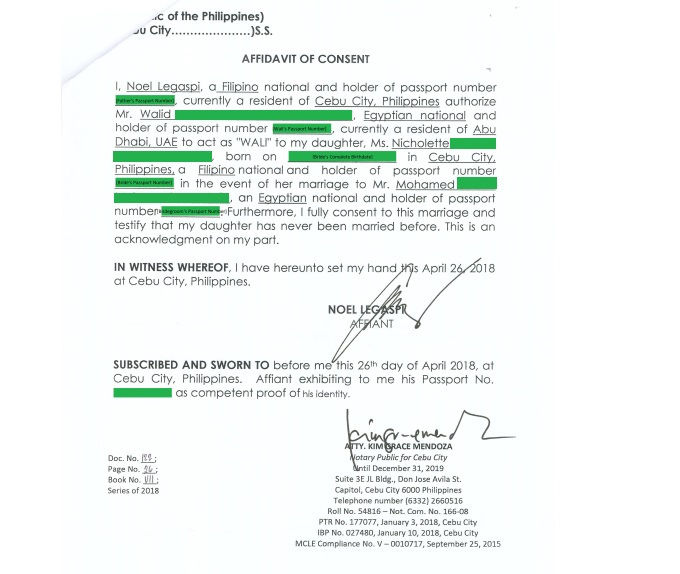
The notarization took place on the very same day of the first appointment, while the Regional Trial Court (RTC) authorization was scheduled a few days later.
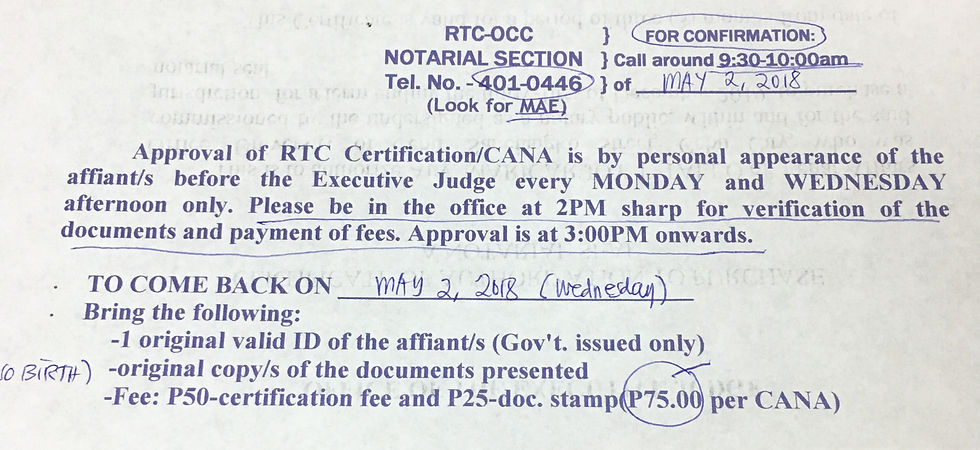
Dad made a personal appearance at the RTC – Region VII (Cebu), with the assistance of one of Atty. Mendoza’s secretaries. He received the “Certificate of Authority for a Notarial Act” on the same day.
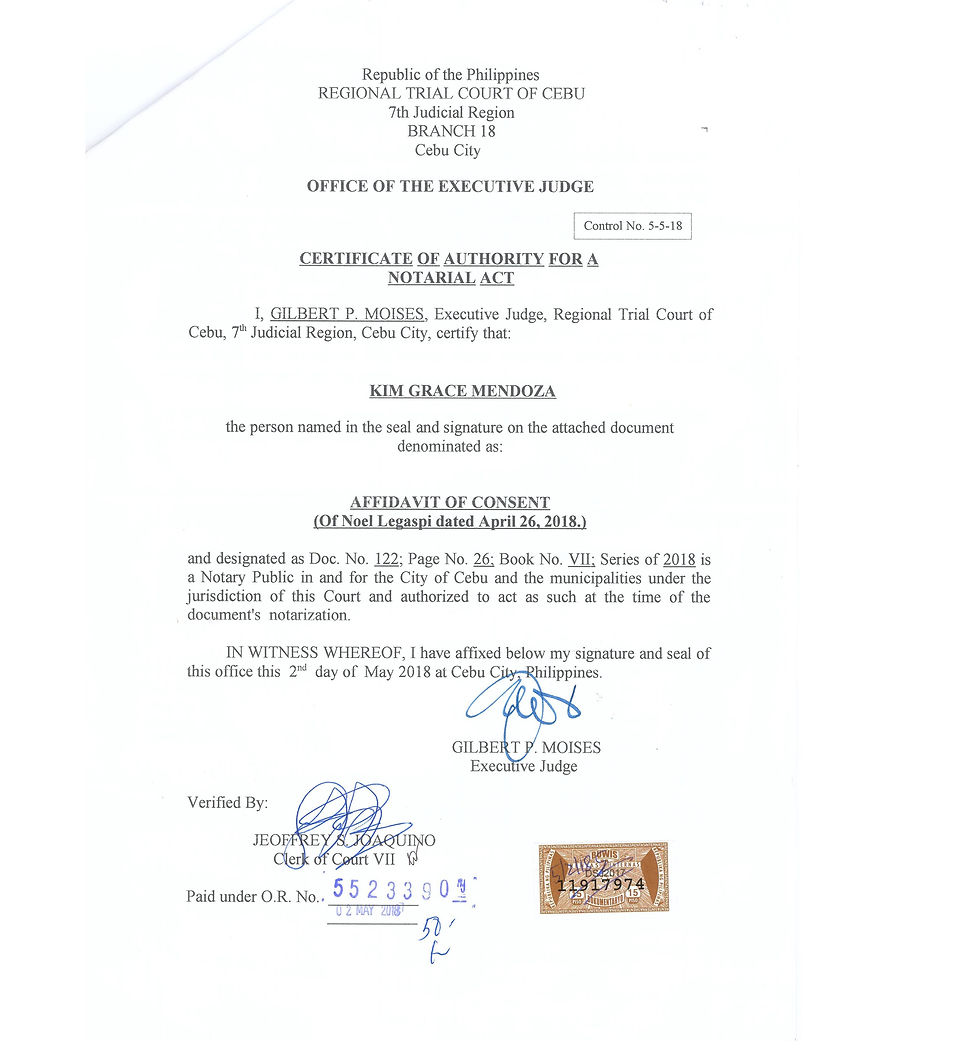
Step 2: Request for an original copy of your CENOMAR (Certificate of No Marriage)
This is more popularly known as the Single’s Certificate.
In the Philippines, it is officially known as the Certificate of No Marriage (abbreviated as CENOMAR).
I ordered my CENOMAR online, because it can easily be done on https://psaserbilis.com.ph/Default.aspx (formerly http://ecensus.com.ph)
I just had to wire an amount to Hazel, my long-distant Maid of Honor, to complete the transaction.
I honestly do not know how it works off-line, that is, if you visit a PSA (Philippine Statistics Authority) office near you.
It will undoubtedly be cheaper than online (they charge you PHP 430 per copy, including shipping fees), so if you know somebody up for the task, then by all means, order yours off-line.
To save time, you can order your CENOMAR online, while waiting for your RTC-stamped “Parent’s Consent” document.
Just don’t order it too early, because the CENOMAR is only valid for 6 months from the date of issue.
If you order online, it takes 7-9 working days for the CENOMAR to be delivered to your home address within Metro Manila and 8-13 working days outside it.
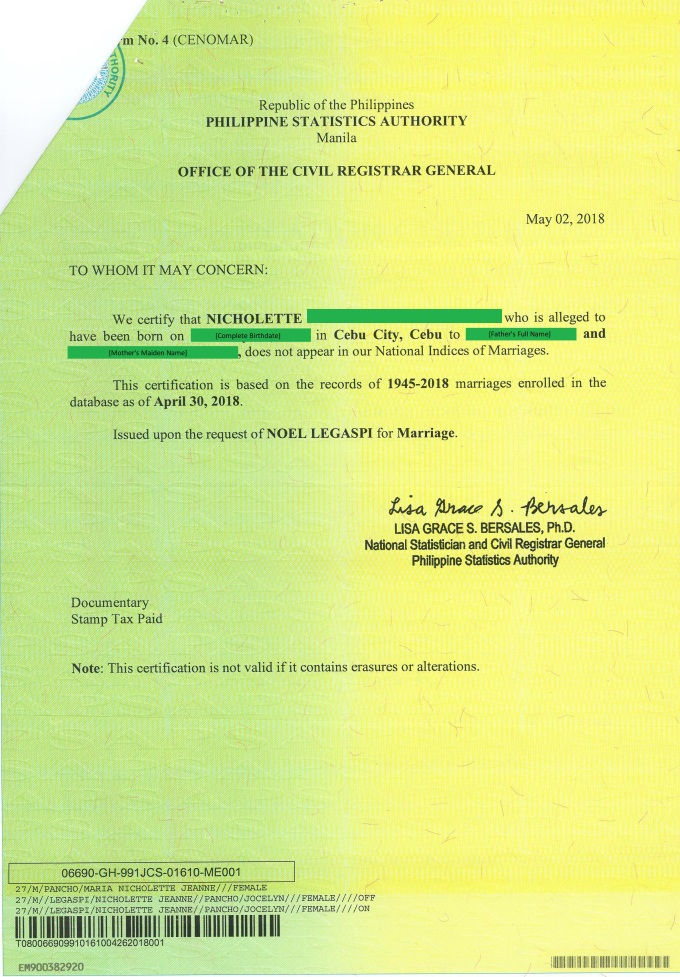
Step 3: Have your Affidavit of Consent and CENOMAR attested by the Philippine Department of Foreign Affairs and UAE Embassy of Manila
There are 2 ways to do this: either you ask a representative to present the documents in person at DFA Manila for stamping or authorize a third-party agency to do it for you.
It should be noted that the UAE Embassy in Manila will not accept walk-in applicants for document authentication.
For this purpose, you need to visit a DHL Express branch, because they are the only third-party agency in the Philippines authorized to do so.
I chose a third-party agency, because my whole family is based in Cebu, a 1.5-hour plane ride away from Manila where both the offices are located.
So I asked Dad to FedEx all my documents to Dubai and filed a “Power of Attorney” document, authorizing LBC to process the authentication of my papers.
To do this, I first had to sign a “Special Power of Attorney” (SPA) document at the Philippine Consulate in Dubai (the SPA form/template is available at the LBC Kiosk inside the Consulate).
Their all-in rate includes sending the documents to the Philippines, forwarding them to DFA Manila for authentication (more popularly known as “Red Ribbon”), forwarding them to the UAE Embassy of Manila for authentication (stamping), and sending them back to Dubai.
You can pick up your documents after 6-8 weeks in either the Philippine Consulate in Qusais (where they have a kiosk) or in Karama (LBC Dubai’s Main Branch).
The LBC service rates are as follows (as of February? this year):

My documents arrived in Dubai just 5 weeks later.
Step 4: Submit your documents for Arabic legal translation
Arabic is the official language of the UAE and the language of the law here.
For this reason, any document submitted for legal purposes should first be translated in Arabic by a Court-authorized translator.
Rates vary per page, but since Waleed, my Wali, works as a PRO, we got discounted rates for translating both documents.
Don’t fall for dirt cheap rates.
Make sure your Arabic translator is authorized by the Court; otherwise, the Court will not accept your document, and you’ll just end up paying double.
Step 5: Have your Arabic-translated Affidavit of Consent and CENOMAR attested by the Ministry of Foreign Affairs
My husband brought our Arabic-translated documents to the Ministry of Foreign Affairs (MoFA) Attestation Office in Marina Mall, Abu Dhabi.
There are several MoFA Attestation Offices spread across the UAE, but it’s best to visit the office nearest to you, with office timings most convenient for you.
Each document stamp costs AED 160 (x2 documents = AED 320).
The MoFA stamp was placed right below the UAE Embassy of Manila’s stamp, on the back portion of the Philippine DFA “Red Ribbon” document.
Step 6: Visit a Court-authorized clinic for a Pre-Marital Medical Test
The Pre-Marital Medical Test is a fairly new requirement for a UAE Court Marriage.
Its primary purpose is to inform the couple about each other’s health condition and to ensure the well-being of their future children.
The requirements are:
Original and photocopies of Emirates IDs (Bride’s and Bridegroom’s)
2 copies of passport-sized photos (Bride’s and Bridegroom’s)
I had to file a leave from work, so that my husband and I could visit the Disease Prevention & Screening Center near Al Wahda.
But when we got there, we were told to proceed to the next “nearest” Clinic in Al Maqtaa.
We told the person in charge of the Information Desk that we saw their Clinic listed on the Abu Dhabi website as one of the Court-authorized clinics for the Pre-Marital Medical Test (there are only a select few).
He said that that website is not updated and that they no longer offered that service.
So my husband and I paid a hefty sum of 50 dirhams for a one-way cab from he Disease Prevention & Screening Center to Al Waqtaa Healthcare Center.

When we arrived at the Clinic, we were asked to proceed to the pediatrics department (don’t ask me why).
We submitted our papers to the receptionist.

And waited for our turn beside 5 or 6 Arab babies, equal parts naughty and adorable.
When it was our turn, Adam paid AED 434 for my medical tests and AED 382 for his.
The first round consisted of a blood pressure check and a height and weight measurement.
The nurse asked me the usual set of questions (“Any allergies to medicines? Food?”) with the exception of one question, which was, “Is this going to be your first marriage?”
Then it was my husband’s turn.
While waiting outside, I signed an authorization letter, allowing Adam to claim both our results 3 days after.
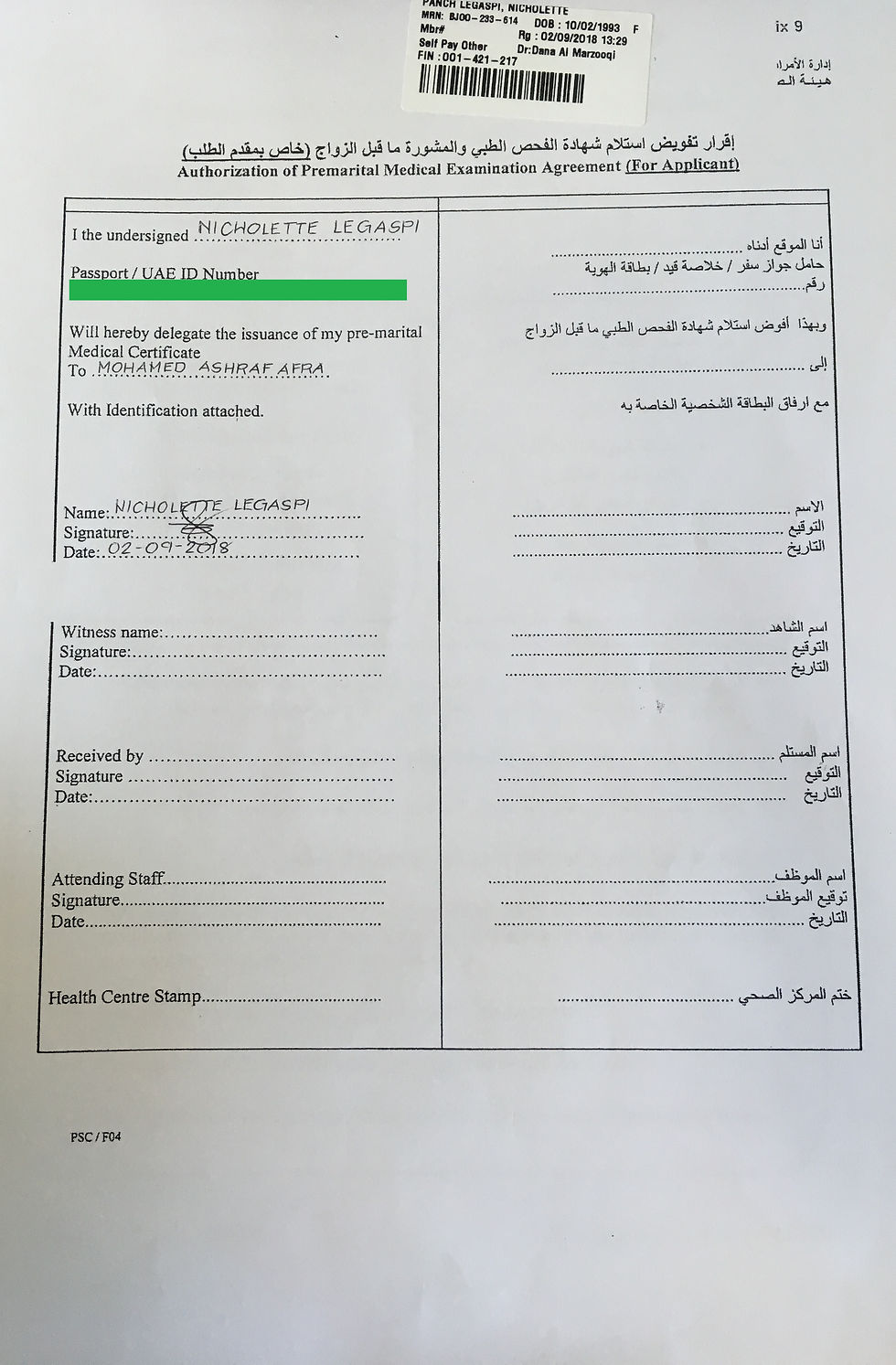
Ideally, the engaged couple would claim their results separately for confidentiality.
I didn’t think it was practical to ask for another work leave and besides, I was fairly confident I would pass my medical exams with flying colors.
The only downside was that I had to give him my original Emirates ID, and as any UAE expat will tell you, you should never leave home without your original Emirates ID.
When Adam came back from his first round of tests, he complained that the weighing scale might have malfunctioned.
—The only possible explanation for his 10-pound weight gain (in his opinion).
Adam and I waited another full hour for the second and last round of tests.

Which involved blood extraction — 3 vials each.
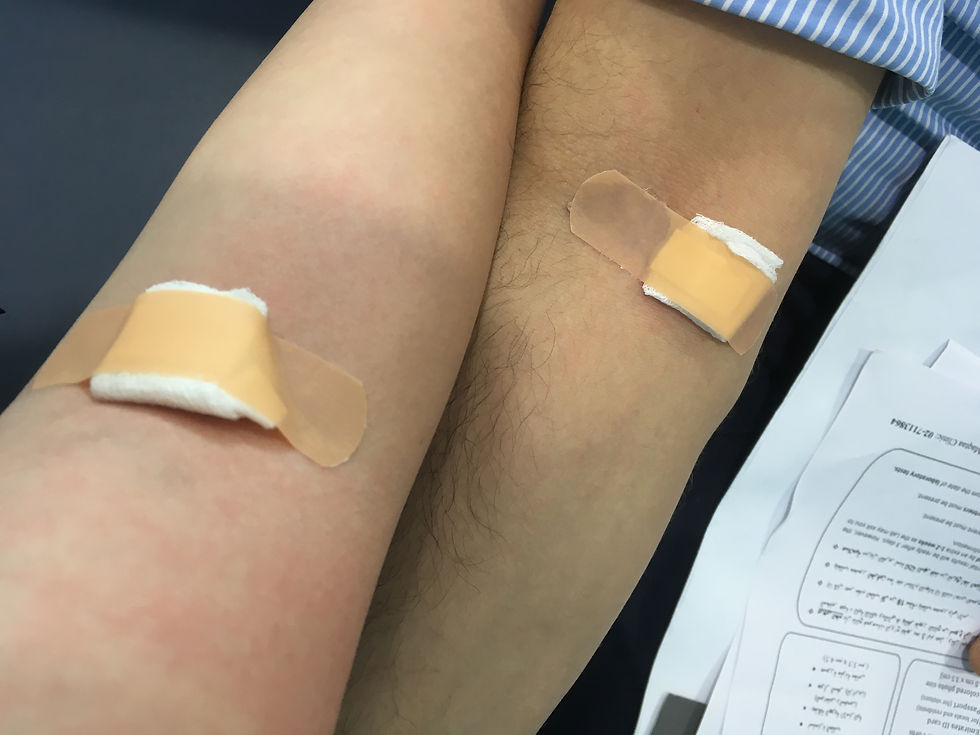
Just don’t ask me the size of the needle, because I shut my eyes and clawed Adam’s arm when it was my turn.
3 days later, Adam went back to the clinic alone and collected both our results.
Step 7: Present all the documents to the Abu Dhabi Courts
By “all” the documents, I mean the attested “Parent’s Consent” document and CENOMAR, the Pre-Marital Medical Test results, and multiple photocopies of our passports, UAE visas and Emirates IDs.
It was only then when we found out that we were still missing the UAE Ministry of Justice (MoJ) stamp on both the attested Affidavit of Consent and CENOMAR.
Each stamp cost AED 50 (excluding VAT).
Otherwise, the process was smooth and hassle-free.
Step 8: Select a wedding date and book an appointment with the Abu Dhabi Courts
This is, by far, the easiest step of all.
Adam and I had an inside joke and dubbed our wedding day as the day we would commit the “Crime of the Century.”
— At least until the day our first child is born.
Adam is Egyptian of Turkish descent from his mother’s side of the family.
I’m Filipino of Chinese and (to a lesser extent) Spanish descent from both my parents’ sides of the family.
I’m at least half-dreading the odd ball combination.
But back on topic, you can schedule an appointment over the phone.
Adam was given 2 options: either to make a court appearance between 8:00 a.m. to 2:00 p.m. or invite the Mazoun (Islamic cleric) to a venue of our choice between 2:00 p.m. to 9:00 p.m.
We chose the latter option, not only for our convenience, but also for our guests’ (who work 8-to-6 jobs).
The in-Court marriage fee is AED 300, while the out-of-Court marriage fee is AED 800.
It took my husband and I a grand total of 18 months, from engagement (ring shopping) to preparing all the legal documents.
But don’t let this get you down.
Adam and I had a lot of surprises (not all pleasant) along the way.
Heck, we even moved to new companies in between, so half the waiting time was spent on non-marriage-preparation-related matters.
There was also the issue of money.
When we first decided to get married, we didn’t have the full amount we needed to complete the documents, even if we had pooled both our savings together.
In all likelihood, we would have taken far longer had we not moved to better-paying jobs in between.
We took it one step at a time and made careful decisions only after honest discussions.
More often than not, those discussions even ended in arguments.
But in retrospect, we are both grateful for the year-and-a-half-long engagement, because we learned things about each other we wouldn’t have learned any other way.






















hi nicholette, i saw your information shared about applying for Visa in egypt.. thank for this because it is very detailed and helpful..